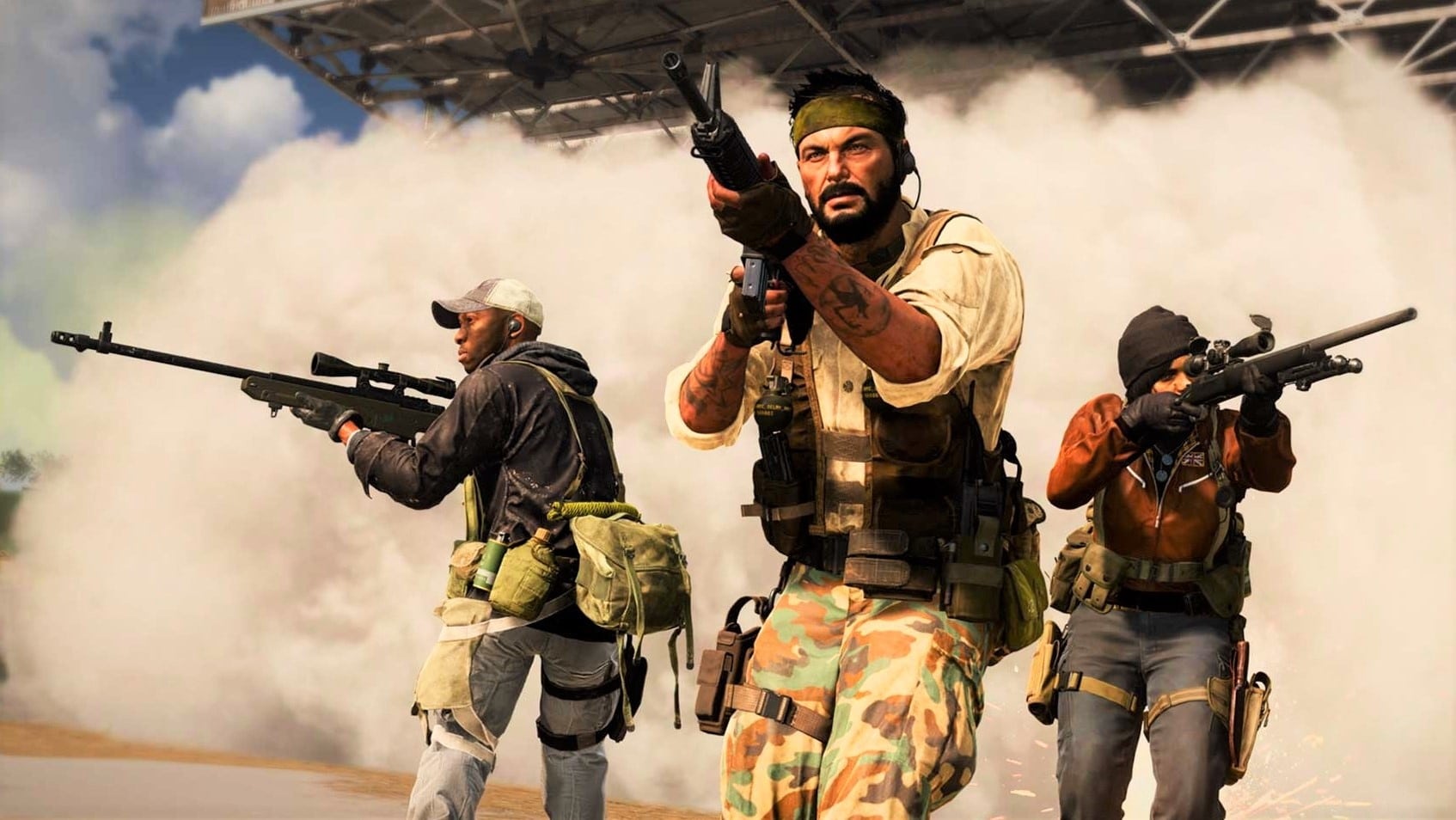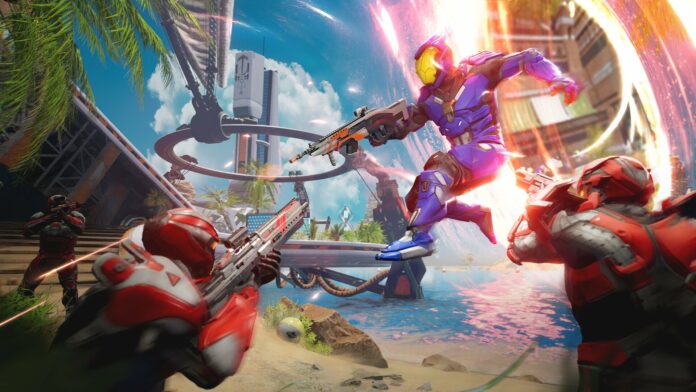My opinion: The fact that Splitgate is going through the roof like this is already an exciting game. Because the shooter genre is ripe for change.
In fact, Splitgate is a bit cheeky. The multiplayer shooter has been going through the roof on Steam for weeks, right now 60,000 people are playing simultaneously, people are brooding on hold for a whopping 90 minutes just to get a coveted spot on the completely overloaded servers – and yet almost every aspect of Splitgate is brazenly cribbed from somewhere.
The kill feedback is exactly like Overwatch, the weapons come from Halo, the map design is somewhere between Quake and UT, the retractable portals come one-to-one from … well, you can guess for yourself. And the playable red and blue super soldiers surf so close to the Halo trademark infringement that even Kelly Slater would bow his head respectfully.
But I don’t even want to point fingers, geez, I’m having way too much fun with the game for that! Dashing through the arenas, targeting people with the DMR, coming up with clever feints – Splitgate’s gameplay is as simple as it is creative. It stirs together a new recipe from all kinds of well-known shooter ingredients, where no one at all wants to ask whether it’s innovative or merely smartly combined or brazenly copied or somehow all of the above.

However, there is a question that should be asked in my eyes: After a years-long aegis of Battle Royale, where classic arena multiplayer had it extremely tough (poor Quake Champions) – how does the success of a Splitgate fit in? And what might it mean for the future of the shooter genre?
Table of Contents
Why is Splitgate going through the roof like this?
The success of Splitgate is more than just Twitch hype. As valuable as streaming may be from a marketing perspective, a game doesn’t dominate the Steam charts for weeks on end if it’s not fun. No streaming celebrity in the world could motivate me to play Anthem on a holiday night.
Whoever now interjects “Well, Splitgate is just fun” is right, but sweeps the special feature of the game a little under the table. Because in 2021 Splitgate seems like a counter-design to Battle Royale: Action is waiting around every corner, there are no breaks, as a player I am permanently involved. My own death is not a real punishment (strange phrase), but I hop right back into the race, shoot my portals, straddle N00bs in the flank, get wiped away by pros, learn,
In 2015, Epic Games wanted to revive Unreal Tournament, but it was never finished. Because all of a sudden it was all about Fortnite! The project has been on hold for three years.” <src=”https://www.global-esports.news/wp-content/uploads/2021/08/In-2015-Epic-Games-wanted-to-revive-Unreal-Tournament-but-it-was-never-completed.-Because-all-of-a-sudden-it-was-all-about-Fortnite-The-project-has-been-on-hold-for-three-years.jpg” width=”960″ height=”540″ />
As much as I like the thrill of long Battle Royale rounds, my buddies and I already breathed a delighted sigh of relief at Warzone’s Rebirth Island because the smaller prison battle royale strips away so much idle time. And here’s the rub: video game trends very often go in waves or cycles.
What was still completely normal in 2016 at the time of Overwatch and Call of Duty: Black Ops 3 – fast-paced deathmatch multiplayer on small maps with small teams – is strangely fresh again five years later, because so many prominent shooters have been focusing on deceleration for years. Even hardcore alternatives like Tarkov, Hell Let Loose or Hunt Showdown are no exception, on the contrary.
Better than Battle Royale?
Of course, Splitgate lacks the reverse of what makes Battle Royale so magical: the individual fates, the tension, the stories. Because my buddies and I have absurd accidents happen in every Warzone round, we hold down the fort in some scuffed barn for far longer than is actually justifiable, we get shaved off by a single helicopter on the hospital roof – because Battle Royale’s greatness produces such unique campfire stories, I would never say Battle Royale is stupid.

But Warzone, PUBG and other strategic multiplayers like Rainbow Six and co. are like fun board game nights: You have to think, plan, achieve long-term victories. The more tactical depth a game offers, the more unique my solutions and approaches feel. Splitgate, in comparison, is like going steep at the disco. Blunt, loud, adrenaline-fuelled – and you queue forever.
Round after round I struggle to put in a good performance and that’s where the disco metaphor ends, but all I’m saying is that Splitgate is exactly the perfect shooter after-work entertainment that the old CoDs were for me. When I’m not in the mood for possible frustration, I play team deathmatches, because it’s simply about nothing. I hardly invest any time in each round, sometimes I score big, sometimes I get beaten up by 12-year-olds.
A sign for the future?
I wish so much that this success will (again) become a school. I’ve already promoted it in this Battlefront video, but because everything on the internet is forgotten after a day anyway, I’ll just break the lance quite cheekily here again:
The classic arena casual shooter is not dead. It just needs the right heirs. Because it has to be said so raucously: a Black Ops: Cold War simply doesn’t do enough to herald a trend reversal again after the Battle Royale or to offer a real alternative.
I’m not saying Cold War is bad (I had fun with it for a while), but to bring the magic of old deathmatch shooters to a new generation, a game has to be more than “old school”. It has to be like Splitgate: a best-of that still doesn’t feel old-fashioned.
Those who experienced the lootbox disaster of Battlefront might have doubts about this, but shooter developers and publishers are quite smart. Call of Duty has extremely cleverly conquered Battle Royale for itself, other shooters like Hunt, Tarkov and Co. are looking for lucrative niches, Overwatch may be working on its own successor – but somehow nobody can inherit the classic casual shooter.
Is the road too far?
But I can imagine that the way there is just too far. Are you bucking the Battle Royale trend now? I’d think twice about that too. Halo Infinite, for example, is a valiant champion of classic arena shooters that few people care about, that we could alternatively just have flaming paper aeroplanes flying around the office while we watch videos of that permanently surprised cat.
And I don’t mean to criticise Halo at all, on the contrary: I’m not looking forward to any other shooter so much at the moment, because Halo Infinite, just like Splitgate, kills two birds with one stone. With Free2Play multiplayer, a surprisingly fair Battle Pass and the like, both shooters open themselves up to modern trends in exactly the right way, but offer me a real alternative.
Have you ever seen the Halo multiplayer gameplay? Well, probably not, because as I said, nobody clicks on it. But check out the video of the Halo multiplayer gameplay. I’m so keen on it!
Why am I telling you this? Because the return of the casual shooter is going to be a rocky, rocky road. Splitgate had to fight for attention for two years in complete obscurity before now, shortly before release, it made the big breakthrough. And it overloaded the servers of the indie project to such an extent that the release had to be postponed.
Halo Infinite, meanwhile, has all the big-budget power behind it, but still has to lead the battered Halo brand past all the shooter competition to old greatness. Whew. And despite all the hype, whether Battlefield 2042 will really take off is also still up in the air.
2021 could be one of the most exciting shooter years in a long time. Games like Splitgate are just harbingers of what’s simmering in the factories – and I hope that the genre gains diversity as a result. Because too many failures could conversely harden the creative fronts even more. And here I simply have to quote Master Yoda: “Unexpected that is, and regrettable … “


